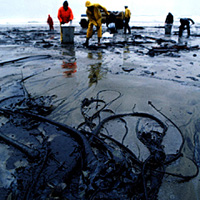Fossil Fuels
Petroleum (Crude Oil) and the Environment
Currently, in the United States, we rely on petroleum (crude oil) as our primary energy source. Unfortunately, obtaining, transporting and using petroleum (crude oil) all have costly consequences on the environment.
| Drilling | Spills | Pollution |
 |
 |
 |
| Extracting petroleum (crude oil) from the ground is not only a costly process but can be environmentally damaging. Drilling on land requires a lot of land use which can disturb local habitats. Two major concerns are that drilling mud is stored in ponds and industrial roads are built in natural areas. Off shore drilling impacts the surrounding marine ecosystem. Specifically, artificial islands are often built in shallow offshore areas. | Since petroleum (crude oil) is toxic and not biodegradable, any type of spill has a harmful effect on the environment. Oil spills are responsible for destroying numerous ecosystems around the world. When an oil tanker spills at sea, oil slicks spread easily over the water killing lots of plant and animal species. The only way to repair the problem is months—or sometimes years—of human intervention. | Refineries emit toxins into the air and water as they process petroleum (crude oil) into usable oil. Then, as they are used, the burning of petroleum products emits toxic substances into the air. The carbon dioxide that is released is contributing to global warming. Other byproducts have been connected to heart disease and respiratory illnesses in humans. The polluted air also affects our plants and animals. |

